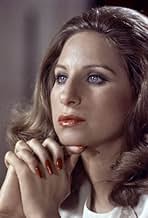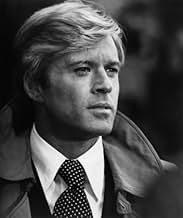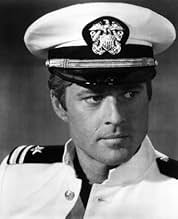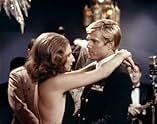During post-WWII McCarthyism, a diametrically opposed couple come together only to find out that genuine friendship and physical attraction is not enough to overcome fundamental societal bel... Read allDuring post-WWII McCarthyism, a diametrically opposed couple come together only to find out that genuine friendship and physical attraction is not enough to overcome fundamental societal beliefs.During post-WWII McCarthyism, a diametrically opposed couple come together only to find out that genuine friendship and physical attraction is not enough to overcome fundamental societal beliefs.
- Won 2 Oscars
- 6 wins & 8 nominations total
Featured reviews
"The Way We Were" released in 1973, stars two of the biggest names in show biz then and now, Barbra Streisand and Robert Redford. The story is basically a weepy melodrama, but who cares? Both of these superstars are the reason to watch. At first, we cannot imagine what they see in one another. They meet in college, circa 1937 -- Katie (Streisand) is a wallflower political activist, Hubble (Redford) is the Golden Boy track star. Yes, both were too old to play college students, so it is obvious the director surrounded them with people their own age, with some decent supporting actors like Lois Chiles and a younger James Woods. The two are reunited by World War II, Redford is in the military but also part of the uppity "Beekman Street" crowd, Streisand is a liberal who is nuts about FDR and working on various political causes. The unlikely twosome fall in love, get married, and do not always have an easy time. Redford doesn't mind his wife's political activity, but he is bored by politics and cannot relate to them. The turbulent 1950's hit, Redford is a writer in "Red Scare" Hollywood who takes the easy way out; Streisand believes people should always stand up for their principles, no matter the cost. Sydney Pollack directed this fine film, and had to convince his friend Redford to take on the part of Hubble Gardner; Redford was reluctant, and it is easy to see why. His character, while a decent guy at heart, is also shallow, somewhat superficial, and doesn't take life seriously. The film obviously exploits Redford's golden boy looks, something he always detested. Streisand's part is obviously the more interesting one, as the part was exclusively written for her. And while her character may not fit in on "Beekman Street," she looks fabulous here. All in all, this is one of the finest romances to come out of the 1970's that also has intelligence and class.
The theme of a golden boy falling for a girl from "another world", be it social class, the "wrong side of the tracks" or fill in your cliché here, is one that goes back to the silent film era. One of the most famous examples is Sydney Pollack's 1973 film "The Way We Were". Set from the 1930's through the 1950's, Barbra Streisand plays Katie, an outspoken member of the Communist party and campus activist who does not have anything handed to her; she works two and sometimes three jobs in order to pay for her living and college tuition. Hubble (Redford) is your typical aforementioned golden boy, a "big man on campus" who indulges in sports, debutantes and all-around good times. The two know each other from the diner Katie works at (he being the patron) and at one point before graduation, briefly bond over their shared passion for writing. Cut to a few years in the future and Katie encounters Hubble at a bar. Hubble is in the armed forces and Katie is characteristically working a couple of jobs while volunteering for various social causes. After a night of drunken sex (Hubble being the drunken one) they embark on an unlikely relationship that spans over a decade and includes a move to California (when Hubble becomes a screenwriter in Hollywood) and the conception of one child. They are happy, but realize that regardless of their desire, they can't completely cross social lines and certainly can't change one another, particularly Katie's ever-ferocious dedication to social causes; a fight that becomes exponentially heated during McCarthy's Red Scare. The two have to decide whether they can sustain enough raw emotion for one another to persevere over everything else that is stacked up against them.
There are several things about "The Way We Were" that require suspension of disbelief (the fact that despite never having had much contact with one another that after one night of drunken lust and an awkward "morning after" being enough to kick start a relationship the magnitude of theirs is the first thing that comes to mind) but the bottom line is that it really is a well-written, well-directed and well-acted film. The two principal characters are full and complex, regardless of whether we are talking about the socially conscience Katie or the socially acceptable Hubble. I suspect they somewhat were written with the intent of familiarity for the purpose of effectiveness, and if this is true, it worked on me. The era in which these two characters were set was a very interesting time in American history, and the characters' actions during these times created some compelling cinema, particularly when it touched on the Red Scare.
But who am I fooling? The main reason people watch this movie, whether for the first time or for the fiftieth is for the doomed romance, and Streisand and Redford deliver in spades. "The Way We Were" was written for Streisand, (something that cause Redford to turn down the part at first, because he knew the film was going to be hers) and her portrayal of Katie is excellent. There are so many perceptions of Streisand nowadays (some of them correct, to be sure) that it's easy to forget that she really does have some serious acting chops, and she exhibits them to full effect here. I also happened to learn that the soft filtered lens thing with her didn't just start with her later movies, for whatever reason she was filmed with that lens more often than not here, but that didn't do anything more than slightly distract me because I couldn't help but chuckle. Redford gives a typical solid performance as well, though his initial doubts about taking the role turned out to be valid; he is not the dynamic figure in the film. However, his character is a strong one and Redford does a good job.
I don't know if Pollack knew he was creating a screen classic when he directed "The Way We Were" but he did make a very good film. If you can make it past some major melodrama and some plot holes (what was the deal with their child?) watch this film, and just sit back and appreciate it for what it is a chick flick that guys don't have to feel ashamed watching. 7/10 --Shelly
There are several things about "The Way We Were" that require suspension of disbelief (the fact that despite never having had much contact with one another that after one night of drunken lust and an awkward "morning after" being enough to kick start a relationship the magnitude of theirs is the first thing that comes to mind) but the bottom line is that it really is a well-written, well-directed and well-acted film. The two principal characters are full and complex, regardless of whether we are talking about the socially conscience Katie or the socially acceptable Hubble. I suspect they somewhat were written with the intent of familiarity for the purpose of effectiveness, and if this is true, it worked on me. The era in which these two characters were set was a very interesting time in American history, and the characters' actions during these times created some compelling cinema, particularly when it touched on the Red Scare.
But who am I fooling? The main reason people watch this movie, whether for the first time or for the fiftieth is for the doomed romance, and Streisand and Redford deliver in spades. "The Way We Were" was written for Streisand, (something that cause Redford to turn down the part at first, because he knew the film was going to be hers) and her portrayal of Katie is excellent. There are so many perceptions of Streisand nowadays (some of them correct, to be sure) that it's easy to forget that she really does have some serious acting chops, and she exhibits them to full effect here. I also happened to learn that the soft filtered lens thing with her didn't just start with her later movies, for whatever reason she was filmed with that lens more often than not here, but that didn't do anything more than slightly distract me because I couldn't help but chuckle. Redford gives a typical solid performance as well, though his initial doubts about taking the role turned out to be valid; he is not the dynamic figure in the film. However, his character is a strong one and Redford does a good job.
I don't know if Pollack knew he was creating a screen classic when he directed "The Way We Were" but he did make a very good film. If you can make it past some major melodrama and some plot holes (what was the deal with their child?) watch this film, and just sit back and appreciate it for what it is a chick flick that guys don't have to feel ashamed watching. 7/10 --Shelly
Actually, "The Way We Were" is both, and happily so. It's a classy romantic period drama about a 1940s wallflower in New York who blooms in love with her ex-jock boyfriend (an old acquaintance from their college days), and the movie overflows with star-power. None of today's celebrities have the kind of chemistry Barbra Streisand and Robert Redford bring to the screen, and Streisand in particular is so deeply into this character that the herky-jerky editing and breathless writing don't harm her or get in the way (the faults can easily be overlooked). When writer Redford adapts his novel into a screenplay and the couple marries and moves to Hollywood in the McCarthy-Blacklist era, her passion for politics gets them both in hot water; that's where this script hits a snag, with increasingly melodramatic plotting (Redford's affair with a former flame) and confusion in the character motivations (this primarily due to hasty, eleventh-hour editing). Still, it is a handsomely-produced movie with a great tearjerker ending and two fine stars who plow right through the nonsense and bumpy continuity. They transcend the make-believe surroundings, turning the picture into something really special, something to remember. ***1/2 from ****
Barbra Streisand and Robert Redford look wonderful in this great story of doomed love. Character development (or arc) is supposed to be one of the basic elements of a good screenplay; but the whole point of Sydney Pollack's 1973 movie is that neither Katie Moroski nor Hubbell Gardner changes. She remains the serious-minded Jewish left-wing activist, and he the easy-going, politically uncommitted WASP, they are when they first meet in college in 1937. Fascinated with each other precisely because they are such opposites, they have an affair, marry and have a baby; but their inability to compromise - or in his case to stop compromising - leads to break-up.
The main action spans the eventful decade from the Spanish Civil War and New Deal, through WWII, to the McCarthy era, by which time Katie and Hubbell have moved from New York to Hollywood, where he is a screenwriter. Though melodramatic and sketchy, the political dimension of the story should not be underestimated; this is one of the very rare American movies in which a communist is treated sympathetically. Presumably much of this side of the scenario stemmed from the personal experience of writer Arthur Laurents, who was the same age as his protagonists, and who had McCarthy-related problems.
Both stars are perfect for their roles; we can see what they see in each other; and we desperately want it to work for them, though we know it won't! Notable in support are Bradford Dillman, Lois Chiles, and James Woods. The theme song, emotionally delivered by Streisand as only she can, is beautiful, but the relevance of its nostalgic lyric to this clear-eyed movie is doubtful.
The main action spans the eventful decade from the Spanish Civil War and New Deal, through WWII, to the McCarthy era, by which time Katie and Hubbell have moved from New York to Hollywood, where he is a screenwriter. Though melodramatic and sketchy, the political dimension of the story should not be underestimated; this is one of the very rare American movies in which a communist is treated sympathetically. Presumably much of this side of the scenario stemmed from the personal experience of writer Arthur Laurents, who was the same age as his protagonists, and who had McCarthy-related problems.
Both stars are perfect for their roles; we can see what they see in each other; and we desperately want it to work for them, though we know it won't! Notable in support are Bradford Dillman, Lois Chiles, and James Woods. The theme song, emotionally delivered by Streisand as only she can, is beautiful, but the relevance of its nostalgic lyric to this clear-eyed movie is doubtful.
It's WWII. Katie Morosky (Barbra Streisand) is a Jewish girl working in New York radio pumping out patriotic programming among her many activist jobs. In a nightclub, she runs into former crush and Naval officer Hubbell Gardiner (Robert Redford). In college, she was a communist student leader struggling to rally against Franco with Frankie McVeigh (James Woods). He was the WASP star athlete, the man around campus, and outwardly lived a carefree life. He's taken with her tenacity and she admires his writing. In the post war years, they are married in Hollywood where he writes for the studio and she fights against Mcarthyism.
She has the better part. He's playing the trophy wife. His hemming and hawing with his writing is a bit infuriating. He's too cool for school except for a few emotional outbursts. Those are great for showing some depth in his character although the couple seems to have only two polar opposite gears. As for her, Streisand gives it her all. There is a grating edge to her character which is not that appealing. I do like that these two flawed characters struggle with their undeniable connection until I can't take their unending fight about politics. Another issue is the unchanging Grecian God beauty of Redford's look. This movie takes place over decades. He needs to change. Maybe give him a buzz cut during the war years. There is the famous song which I wouldn't diss or praise. Pollack delivers a solid melodrama although the relationship gets too melodramatic at times.
She has the better part. He's playing the trophy wife. His hemming and hawing with his writing is a bit infuriating. He's too cool for school except for a few emotional outbursts. Those are great for showing some depth in his character although the couple seems to have only two polar opposite gears. As for her, Streisand gives it her all. There is a grating edge to her character which is not that appealing. I do like that these two flawed characters struggle with their undeniable connection until I can't take their unending fight about politics. Another issue is the unchanging Grecian God beauty of Redford's look. This movie takes place over decades. He needs to change. Maybe give him a buzz cut during the war years. There is the famous song which I wouldn't diss or praise. Pollack delivers a solid melodrama although the relationship gets too melodramatic at times.
Did you know
- TriviaFilmed amid the ongoing Watergate political scandal, Robert Redford initially wanted the film to focus on the blacklisting of actors and writers during the McCarthy era. He was unhappy with cuts made to the film following a preview. "I think we'd both have preferred a more political Dalton Trumbo-type script," Redford recalled, "but finally Sydney came down on the side of the love story. He said, 'This is first and foremost a love affair,' and we conceded that. We trusted his instincts, and he was right."
- GoofsWhen the radio announcer refers to the time of Franklin Roosevelt's death, he says it occurred at 5:45 in the morning. President Roosevelt died in the early afternoon.
- Quotes
Hubbell Gardner: People are more important than their principles.
Katie Morosky Gardner: People ARE their principles.
- ConnectionsFeatured in Film Extra: Sydney Pollock (1973)
- SoundtracksThe Way We Were
Composed by Marvin Hamlisch
Lyrics by Marilyn Bergman and Alan Bergman
Sung by Barbra Streisand before the opening credits and during the end credits.
Music played often in the score
Details
Box office
- Budget
- $5,000,000 (estimated)
- Gross US & Canada
- $45,000,000
- Gross worldwide
- $45,000,493
Contribute to this page
Suggest an edit or add missing content















































